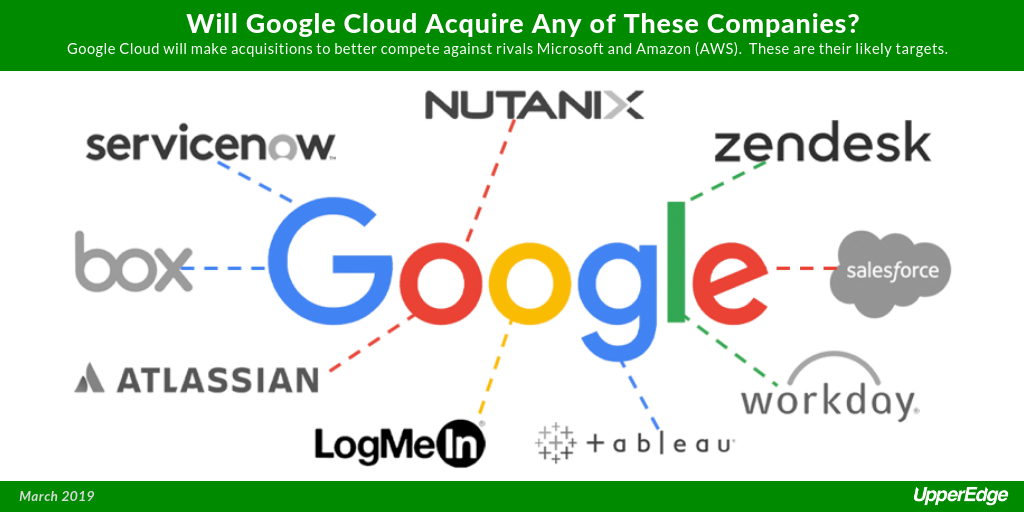- Adam Mansfield
- Reading Time: 4 minutes
This week, I take a closer look at the recent Google Cloud outage that was felt by many and just how concerned current and potential enterprise customers should be. I also cover a couple of recent moves and announcements made by Google Cloud to strengthen its ability to land more enterprise customers.
Google Cloud Outage – How Concerned Should Potential Enterprise Customers Be?
To put it lightly, Google did not have a very good weekend this past week. Google services, Gmail, G-Suite, and YouTube were very slow or completely down on Sunday for more than 4 hours and let’s be honest, “slow” might as well be down. To make things worse, the outage’s impact was even wider spread. The outage, which was tied to Google’s Cloud Platform (GCP), affected 3rd party applications and services including Snapchat, Discord, Vimeo, as well as Apple’s iCloud services. Nest, a Google-owned company, was also affected by the outage.
In a statement from Google, the issues stemmed specifically from “high levels of network congestion in the eastern USA.” Regarding Google’s plan to ensure this doesn’t happen again, on their Google Cloud Status Dashboard, they wrote:
“We will conduct an internal investigation of this issue and make appropriate improvements to our systems to help prevent or minimize future recurrence. We will provide a detailed report of this incident once we have completed our internal investigation. This detailed report will contain information regarding SLA credits.”
It is nice to know Google has identified the root cause and is making improvements to help prevent it from happening again but the fact that the outage stemmed from “high levels of network congestion” is a bit concerning, considering one would have to imagine network congestion is only going to increase or get worse if Google and Google Cloud successfully land more enterprise customers — a goal they are actively working and doing whatever they can to make happen (recent supporting announcements below).
If you are one of the enterprises currently considering a move to G-Suite or Google Cloud Platform, how could you not be concerned or at least more concerned then perhaps you were before the weekend? SLA credits are nice and all, but if we are being honest with ourselves, they often are not going to cover or make up for the devastating impact an outage has on your business.
If you and your enterprise are considering a move to Google (G Suite and/or Google Cloud Platform), and Google is offering you deep discounting or even perhaps a period of free use, my recommendation is to thank them for the offer. But instead, ask them to take a step back and spend a little more time on guarantees they can make to ensure an outage like this one doesn’t impact your business in the future.
Google Continues to Make Moves to Grab Enterprise Customers
It is quite clear that Google’s current and go-forward strategy is focused on doing whatever it can to grab valuable market share from Microsoft (Azure) and Amazon (AWS). They have also made it clear that they don’t necessarily need to be “the” cloud provider for a particular enterprise, but of course, they would certainly take that. Given the hybrid cloud strategy to which Google is executing and making publicly known, they are seemingly perfectly fine with just getting a piece of the pie. But given the size of the pie and the strength of the competition (Microsoft and AWS are already present in most companies), that is not a bad plan of attack.
Google is also very much interested in getting more enterprises to adopt G Suite. Another way Google is trying to penetrate enterprises and grab market share from Microsoft (as an Office 365 replacement), is through aggressively pursuing enterprises’ deskless workers or “firstline workers.” As more and more enterprises continue to make investments in this portion of the workforce by giving them the digital tools they need to be successful, and as they look for the next new thing, Google will continue to get more ‘at bats’ and start winning more deals.
Google’s success will also be driven by the behavior of Microsoft. We have come across multiple examples where long-standing Microsoft customers have started to evaluate Google simply because they were done dealing with Microsoft (well maybe not “simply”). They are seizing the first real opportunity (in their minds) to walk away. Some have even made the decision to move away from Microsoft.
One move Google recently made that aligns perfectly with their enterprise strategy, is bringing on former Nutanix Chief Product and Development Officer, Sunil Potti. According to Nutanix CEO, Dheeraj Pandey, Potti will be resigning from Nutanix effective June 21st and moving on to Google. While at Nutanix, Potti led the efforts to integrate Nutanix’s software stack with Google Cloud. This move certainly enhances Google ability to execute their enterprise strategy, but it also strengthens the partnership and connection between Nutanix and Google Cloud, which has been in place for roughly 2 years. Could Nutanix eventually get acquired by Google? I wouldn’t be surprised.
Another recent announcement is that Google is making it easier for Box cloud customers – specifically, Box Enterprise customers and subscribers — to transfer their files and migrate to G Suite. This will be part of the G Suite migration service that was made available in beta in March of this year. This move makes perfect sense. Data is king and anything that makes it easier to move, manage and access will resonate with enterprise customers and potentially help motivate utilization of G Suite if the enterprise is already a Box customer.
This announcement comes not that long after the Box for G Suite integration announcement from late last year where Google Docs users can create, edit and save their documents from inside Box (Google Drive is no longer needed). There have been many announcements strengthening the partnership between Box and Google over the years. Could Box be another acquisition target? Similar to Nutanix, it may make too much sense for it not to eventually happen.
Related Blogs
Microsoft and Google Are Forcing Customers to Adopt AI at a Premium Price: What Customers Need to Know
Consumers Are the Gateway to Enterprise Adoption: Microsoft vs. Google
Google Cloud’s 2020 Plan for Winning the Enterprise
About the Author

